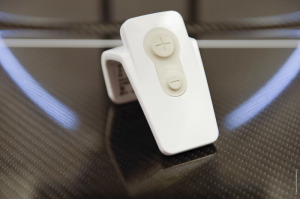por
John R. Fischer, Senior Reporter | September 05, 2017
A new device on the U.S. market may offer mammogram patients more physical comfort and reduced anxiety during examinations.
The FDA has approved the commercialization of the Pristina Dueta, a feature of GE Healthcare’s mammography system, Senographe Pristina, that allows patients to control and alter the amount of compression applied to their breasts during routine mammograms.
“We know women want a more comfortable mammogram experience because pain and anxiety is a factor that prevents one in four women from getting screened annually,” Agnes Berzsenyi, president and CEO of GE Healthcare's Women's Health, told HCB News. “With known evidence that finding breast cancer early reduces a woman’s risk of dying from the disease by 25-30 percent or more, GE Healthcare designed Pristina Dueta to address the fear, pain and anxiety associated with a mammogram. Pristina Dueta puts the patient in control with support and guidance from the technologist.”




Ad Statistics
Times Displayed: 45177
Times Visited: 1385 Keep biomedical devices ready to go, so care teams can be ready to care for patients. GE HealthCare’s ReadySee™ helps overcome frustrations due to lack of network and device visibility, manual troubleshooting, and downtime.
Traditional mammograms require technologists to compress breasts, often causing discomfort and heightened levels of nervousness for patients.
Pristina Dueta is a handheld wireless remote control that allows patients to increase or decrease compression. The technologist applies compression and then guides the patient in using the remote to adjust the amount. The technologist will then check and verify if the amount is correct or needs to be adjusted.
Approval for the sale of the device was granted on the basis of a clinical test, which proved that patient-assisted compression did not reduce image quality or add time to exams.
The device makes the Senographe Pristina the first 2-D digital mammography system to offer patient-assisted compression in addition to other added features for increasing comfort for women during exams, such as the design of the system, which consists of rounder edges, a thinner image detector and armrests that don’t tense up during compression, thereby increasing relaxation for patients.
The first of these systems in the U.S. was installed this year at the
Christine E. Lynn Women’s Health and Wellness Institute at Boca Raton Regional Hospital in Florida. The hospital adopted both a 2-D and 3-D version of it.
Berzsenyi says that Dueta has the potential to one day become a standard tool for patient comfort during mammograms.
“We’re finding that Dueta is best suited for patients that experience anxiety or stress about discomfort from compression during the mammogram,” she said. “At the end of the day, this provides a proactive approach for patient engagement and improved satisfaction.”
The device and the system are currently approved for sale in Europe, Japan and Canada.

